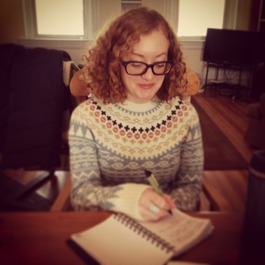 JACQUELINE LAWTON: Why did you decide to get into theatre? Was there someone or a particular show that inspired you? LIZ MAESTRI: There’s no way to make this sound cool. When I was about 13 years old, I saw Les Mis on Broadway. Something within became possessed—I promptly asked my mother for the soundtrack, memorized it, and started auditioning. That same year, I saw STC’s Macbeth with Stacy Keach, and that’s when I decided to “get serious.” Uh-oh, look out! JL: Next, tell me a little bit about your writing process. Do you have any writing rituals? Do you write in the same place or in different places? LM: So far, every script has had its own process, ranging from creating outlines to hammering 60 pages out in two sittings. I hope to someday find a steady, comfortable rhythm, but for now am enjoying these different explorations. Two things I like to do for every script, however, are to create a soundtrack and a design concept. Might as well use that Theatre BA for something, amirite? I like to write on a deadline. I like quiet, studious environments. I also like privacy, because I find it helpful to play scenes out loud as I go along, and I’d rather no one be listening to that. JL: Describe for me all the sensations you had the first time you had one of your plays produced and you sat in the audience while it was performed...what was different about the characters you created? How much input did you have in the directing of that work? LM: When Taffety Punk produced my first play (Owl Moon) in 2011, I was so dumbstruck by this good fortune, I never felt compelled to intervene in the rehearsal process. I also didn’t need to because everything was rather serendipitous—the play was written before I met the Punks, but all five roles found a perfect fit with a company member, and the cast, design team, and director all went above and beyond. Being able to just sit back and watch the play get out of my head and onto a stage was both liberating and a great lesson in letting-go. The sensations I felt as I sat in the audience for the first time are probably sensations you don’t want to hear about. I thought I wouldn’t get the dreaded gurgle-wurgle of stage fright from seeing my own play performed, but no dice. The feelings I had, however, were huge. HUGE! I had never felt true pride before, not like that. It was what I imagine it would be like to see one's child do something amazing. Pretty sure I cried in the bathroom from the sheer emotion of it. JL: What do you hope to convey in the plays that you create--what are they about? What sorts of people, situation, circumstances, do you like to write about? LM: I often write about loss in one form or another. Many of my characters are people who don’t handle it well, but who persist. I’m really interested in bravery, particularly bravery in the face of change, inevitability, and uncertainty. I also love to work with elements of the natural world, magic, and supernatural acts or characters. JL: Tell us about your play and what inspired you to write it. LM: I don’t recall where the initial inspiration to write Fallbeil came from—I think it may just have been out of obsession with Sophie Scholl. I legitimately fell in love with her. I had taken German language classes in high school and college, and wondered why so few people in the US know the story of the White Rose. I really wanted to write something educational, and had to come to terms with the fact that writing straight history plays is not something I’m cut out for. I started working with this device where “a redheaded playwright” is onstage, watching and interacting. It was structured as a kind of funeral service. Eventually, the idea developed into a fantasy piece with a storyline that is more closely tied to the politics and anxieties of today, but I hope that the play still conveys the love and respect I have for this person I’ve never met. JL: What do you want audiences to think about after experiencing your play? LM: To think about how lucky they are, and how free. To love the people in their lives and to not take their time on Earth for granted. To aim higher. JL: What advice do you have for up-and-coming playwrights? LM: Listen more, talk less. And work hard, because talent alone isn’t enough. JL: What’s next for you as a playwright? Where can we follow your work? LM: Besides working with the Field Trips, next up are two projects in May: a reading of my play House Beautiful at Theater J’s Locally Grown Festival, and a run of Condo Condo Condoland at the unstoppable EMP Collective in Baltimore. About Field Trip Theatre Field Trip Theatre is committed to supporting emerging artists through development and production of new plays that engage diverse audiences and reflect the perspectives and identities of The District. We value innovative storytelling and uncensored artistry that serves the diverse community of Washington, DC. On Sunday, March 10th at 8:00pm, Field Trip Theatre will present a reading of Fallbeil by Liz Maestri at the the Wonderland Ballroom. Tickets to this event are sold out, but click here to be added to waitlist.
1 Comment
michael vignola
3/7/2013 01:07:53 pm
liz,I'm impressed and wish you only success in all your works!!!
Reply
Your comment will be posted after it is approved.
Leave a Reply. |
My BlogI'm a playwright, dramaturg, and teaching artist. It is here where you'll find my queries and musings on life, theater and the world. My posts advocate for diversity, inclusion, and equity in the American Theatre and updates on my own work. Please enjoy!
Categories
All
Archives
June 2020
Reading List
|
